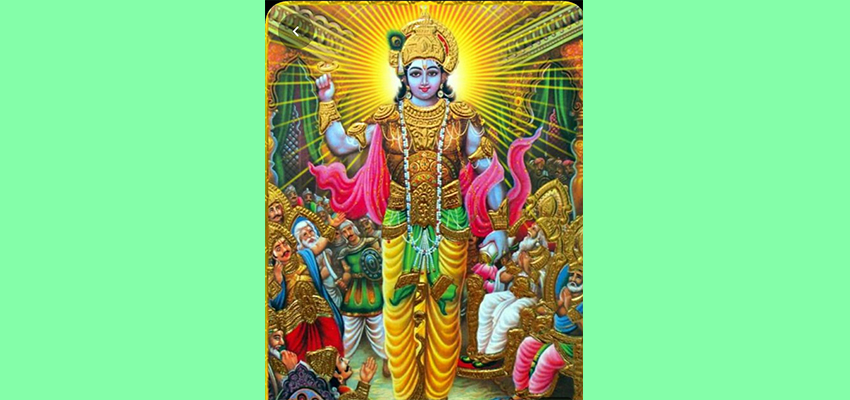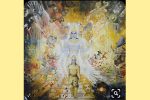NAME 14
Puruṣaḥ पुरुषः
The one who resides in a body. Pura means a fort. Body is compared to a fort. Nine openings in the body are the nine gates. Bhagavad Gita (V.13) says, ‘navadvāre pure’. The nine openings in the body are – pair of eyes, pair of ears, pair of nostrils, mouth, organs of procreation and excretion. Puruṣa refers to the individual soul. Soul by remaining within the fort, rules the fort.
Puruṣa is often used in Sāṃkhya philosophy and Bhagavad Gita is based on this. As per Sāṃkhya philosophy, the existence is based on twenty five principles or tattva-s, out of which puruṣa is the foremost. Puruṣa is the conscious spirit which only acts a witness. They are passive and non-productive. There are number of such puruṣa-s, also known as souls. What is called as puruṣa in Sāṃkhya philosophy is known as ātman in Vedanta. The fact is whether we call it as ātman or puruṣa, it is the indispensable factor in creation of a life.
१४. || ॐ पुरुषाय नमः||
14. Om Purushay Namah
Purushah -One who dwells in the Fort-city (Purisete iti Purushah). Herein metaphorically the Rishis conceive our body as a fortress with nine gate-ways-“Nava-Dvāre Pure Dehī ”-(Geeta Ch. 5, St. 13) -and declare the One who rules within it, like a king, is the Self.
This term can also be dissolved in two more different ways giving more and more suggestions to the nature of the Self. Thus, Purusha can mean “That which was before all creatures” -Puraa Aaseet iti Purushah or it can be
“One who completes and fulfils the Existence everywhere”, meaning, without whom Existence is impossible (Poorayati iti Purushah).
This Aatman remains in the bodies of living creatures as their individuality (Jeeva) and in all the activities, physical, mental and intellectual. Aatman is not in fact involved but is therein only an observer of all that is happening. Purushah
a) One who bestows on the Muktas the enjoyment of the Bliss of Himself in plenty.-purusanoti iti purushah.
b) One who is reclining in this body – purisete iti purushah.
c) One who existed before anything else existed – purAAsIt iti purushah.
d) One who completes and fulfills existence everywhere – pUrayati iti purushah
INTERPRETATION GUIDED BY SANT VANI (WORDS OF SAINTS)
Puruṣaḥ
The indweller of the city.
In Hindi and many regional languages of India, puruṣaḥ refers to a man. In Sanskrit, this word is looked at from different standpoints, besides the meaning of a person.
Puram śarīram–this physical body is the pura, city.
Tasmin sete iti puruṣaḥ– The one who resides in the body is called puruṣa. In the Mahābhārata, Bhiṣma tells Yudhiṣṭhira, ‘This physical body is a city with nine gates. It is endowed with the pranas, the indriyas and the antahkarana, all put together as an assemblage, because of previous punya. That mahatma, the Lord, pervading the entire body, remains there without getting affected. Therefore, He is called Puruṣa’ (Mahabharata.Sa. 210.37).
Bhaktānām hrdayaṁ pūrayati iti puruṣaḥ – the one who fills up the hearts of the devotees, that is, the one who gives happiness, is puruṣa. Generally, people think that music, money or power fills up the heart. But the jijnāsu-bhakta recognizes that it is the Lord who fills up the heart of the devotee.
There are basically two kinds of devotees referred to in Bhagwat Gita 7.16
Arjuna, the foremost in the clan of Bharata! People given to good actions, who worship me are four-fold – the distressed, the seeker of security and pleasure, the one who desires to know (Me), and the one who knows (Me).
The first kind are the Ārta and Arthārthi devotees.
Ārta-bhaktas, are devotees who are indistress. They do not think of Īśvara until they get into trouble. Once they get into trouble, then, they come to Īśvara. They recognize, that it is only the grace of Īśvara, which will make a difference and so they finally pray and invoke the grace of Īśvara. Hence, they are devotees.
Arthārthi-bhakta–These devotees think of Īśvara before any undertaking. They know that they themselves cannot accomplish whatever they have undertaken, because they recognize that there are hidden variables over which they have no control. Even the known variables, cannot be totally controlled. When this is so, how can the ajnāta-pratibandhas, the hidden variables, obstacles, be controlled? One does not know them, because they are hidden. Therefore, these persons invoke the grace of the Lord to take care of these unknown obstacles.
This is what everyone does. So, whenever one undertakes a pursuit for accomplishing something, he invokes the grace of the lord. Even before starting the class, a prayer is chanted, because the blessing of the guru and Īśvara is required, in any pursuit. We do not want any obstacles in our pursuit and hence we pray. Even when a book is written, it starts with a prayer. Scholars refuse to accept and read a work, if there is no prayer.
The idea is that the person, who does not recognize these hidden variables, is immature. Prayers are only to influence the hidden variables. Any mature person will recognize the hidden variables. In general, the devotees are ārta and arthārthi- bhaktas.
The second type of devotees are the jijṅāsu and jṅāni devotees. This type of devotee is rare. Jijṅāsā means the desire to know. Here the desire is to know Isvara. Jijṅāsu-bhakta is a devotee, who has jijṅāsā, the desire to know who Isvara is and what His svarupa, nature is? The knowledge of Īśvara is his first priority in life, What he wants is not just a general idea, but a clear and total knowledge of Īśvara. He has come to know that whatever can be got by fulfilling desires, is got by knowing Isvara and by this knowledge, one becomes secure. There is no greater security other than knowing Īśvara.
Once this is clear knowledge, then he becomes a jṅānī-bhakta. Sri Krsna says, ‘jṅānītuātmaiva me matam – the jṅānī, the one who knows, is myself.’ He understands that the Lord is pūrna, the whole and not separate from himself.
Therefore, the jijṅāsu-bhakta is the real bhakta. He too prays to the Lord to help him in his pursuits and when in distress. But, he is not satisfied with simple things from God. He is certainly not an underachiever! He wants God himself.
So the one who pūrayati, fills up the devotees’ heart, is the puruṣa. He is the pratyagātmā, who resides in the hrdayapura, who is indeed the parmātmā.
The Atma Upanishad says:
Purusha manifests itself three ways:
As outer, inner, and the supreme Self.
Skin, flesh, vertebral column, hair, fingers, Toes, nails, ankles, stomach, navel, hips, thighs, Cheeks, eyebrows, forehead, head, eyes, ears, arms, sides, Blood vessels, nerves: these make up the outer self, The body, subject to birth and death.
The inner self perceives the outside world, Made up of earth, water, fire, air, and space. It is the victim of likes and dislikes, Pleasure and pain, and delusion and doubt.
It knows all the subtleties of language, Enjoys dance, music, and all the fine arts;
Delights in the senses, recalls the past, Reads the scriptures, and is able to act. This is the mind, the inner person.
The supreme Self, adored in the scriptures, Can be realized through the path of yoga.
Subtler than the banyan seed, subtler Than the tiniest grain, even subtler Than the hundred-thousandth part of a hair, This Self cannot be grasped, cannot be seen.
The supreme Self is neither born nor dies.He cannot be burned, moved, pierced, cut, nor dried.
Beyond all attributes, the supreme Self Is the eternal witness, ever pure, Indivisible, and uncompounded, Far beyond the senses and the ego.
In him conflicts and expectations cease.
He is omnipresent, beyond all thought,
Without action in the external world, Without action in the internal world.
Detached from the outer and the inner, This supreme Self purifies the impure.
He who dwells in the “Nava-Dwāra-Puram” i.e. the house with 9 doors/openings – he is that very PURUȘA. That “Nava-Dwāra-Puram” has been acquired only because of some meritorious deeds done in past births. “He” – that PURUȘA dwells within that “Nava-Dwāra-Puram” (the human body) both pervading it and also interpenetrating it. Know him as that PURUȘA
Again here I have chosen to go with Śaṅkara’s interpretation as it is more relatable. However, Parāsara’s interpretation of the name is also included as the concluding section of this post.
The reference to the body as the “Nava-Dwāra-Puram” can be found in the Śrīmad Bhāgavatam but the specific reference that mentions that the PURUȘA dwells within the “Nava-Dwāra-Puram” comes from the Mahābhārata, Śānti Parva:
Nava-Dwāram puram puņyam etairbhāvaiḥ samanvitam vyāpya sete māhātmā yaḥ tasmāt PURUȘA ucyate
This city of nine doors/openings that has been acquired as a result of meritorious deeds (puņyam), is pervaded by that great Ātmā and he is known as ‘that’ PURUȘA
By interpreting the name as Purā Āsit, He is the one who existed always. He is also ‘that’ which is Pūrņa and Pari-Pūrņa – complete and perfect in all respects
He who is the giver of many ‘fruits’ Purūņi Phalāni Sanoti (Sanoti = Giver/one of bestows/grants)
He who lives among the most eminent – PURUȘ Utkarșasālisu Sīdati
He who brings about ‘pralaya’ that destroys the whole of creation (his own creation) – Purūņi Bhuvanāni
Parāsara Battar focuses primarily on the aspect of ‘Giving/Bestowing’. According to him, ‘Puru’ means plenty and therefore by PURUȘA is meant “He who is the generous giver, the one who bestows “bliss-eternal.” Bhagawan is “Andandamaya’ and the source of bliss and eternal joy and it is this joy that he bestows upon to the Muktas and Bakthas.
“Please never let me forget that in all circumstances, and in everything I do, you alone are my path, you are my goal, you are my destination, you are my intelligence and you are my intellect. All I ask for is that in every lifetime please let me be by your lotus feet.”
Other scriptural references:
Purāevaāsīt iti puruṣaḥ – since He was there even before anything came into existence, He is called Puruṣa.
Puruṣaut karṣaṣāliṣusīdati iti puruṣaḥ – Further, He is known as Puruṣa because He resides, is well recognised in things which have excellence and eminence. Again, purūṇiphalānisanoti, dadāti iti puruṣaḥ–He gives in abundance. In fact, He gives the limitless result called mokṣa.
Purūnṇbhuvānanisaṁhāra-samayesyatiitipuruṣaḥ–He destroys all the worlds at thetime of pralaya.
Pūraṇātsadanātvā puruṣaḥ–He pervades everything and resides therein, that is, He is all-pervasive.
Om Swami interprets a beautiful stuti, explaining the humility one experiences with God once they surrender in complete and utter devotion. Listen to this video discourse and immerse yourself in the divine grace.
ॐ
जितं ते पुंडरीकाक्ष नमस्ते विश्व भावना
सुब्रह्म्णाय नमस्ते अस्तु महापुरुष: पूर्वज:
नमो हिरण्यगर्भाय प्रधानव्यक्ति रूपिणे
ॐ नमो वासुदेवाय शुद्ध ज्ञानस्वरूपिणे
देवानाम दान्वानाम च समान्यवसि दैवतम
सर्वदा चरन वन्दम वृजामि शरणम तव
एकस्यत्वमसि लोकस्य सृष्टा सन्हारकस्तथा
अध्यक्षश्चनुमन्ता च गुणमाया समावृता
संसार सागरम घोरम अनन्तम क्लेश भाजनम
त्वमेव शरणं प्राप्य निस्तरन्ति मनीषिण:
नाते रूपम ना चाकारो नायुधानि ना चाश्पदम
तथापि पुरुषाकारो भक्तानाम त्वम् प्रकाशसे
नैवे किञ्चित प्रोक्छम ते प्रत्यक्षोऽसि न कश्यचित्नैवे –
किञ्चित साध्यम ते न च साध्योऽसि कश्यचित्कारणाम –
कारणम पूर्वम वचसाम वाचम उत्तमम
योगिनाम परामाम सिद्धिँ परमम ते वदम विदु:
अहं धीतोऽस्मिन देवेश संसारेऽस्मिन महाभय
त्राहिमाम् पुण्डरीकाक्ष न जाने शरणम् –
परम्कालेस्वपि च सर्वेसु दिक्षु सर्वासु च अच्युतशरीरेऽपि –
गतोचाऽपि वर्तते मे महद्वयम्
त्वतपादकमलादनत्र मे जन्मानतरेस्वपि निमित्तम् कुशलस्यऽति येन गच्छामि सदगतिम्विज्ञानम् –
यदिदम् प्राप्तम् यदिदम् ज्ञान मूर्तिजम्जन्मान्तरेऽपि मे देव मा भूदृश्य परीक्षया
दर्गतामपि जातायाम् त्वम् गतिस्त्वम मतिर्मम यदि नाथम् च विज्ञेयम् तावत्ऽस्मि कृतिसदाअकाम –
कलुषम् चित्त मम ते पाद्यो स्थितम्काम्यैव वैष्णवऽन्तु सर्वजन्मसु केवलम् |
हरे कृष्ण हरे कृष्ण
कृष्ण कृष्ण हरे हरे
हरे राम हरे राम
राम राम हरे हरे॥
श्री हरि भगवान की जय
||ॐ नारायणाय विद्महे महापुरुषाय धीमही तन्नो विष्णु प्रचोदयात् ||



